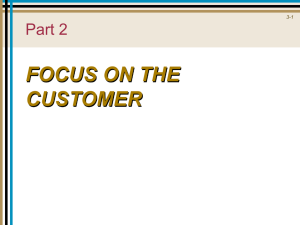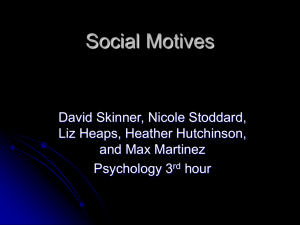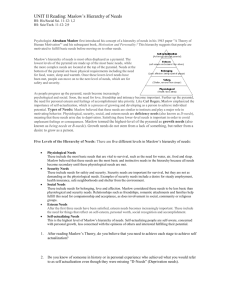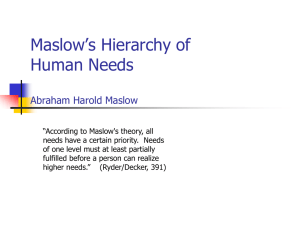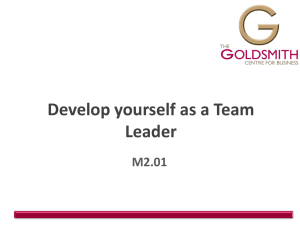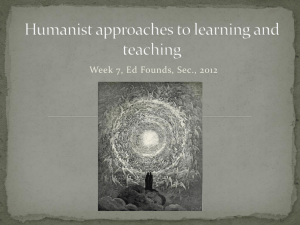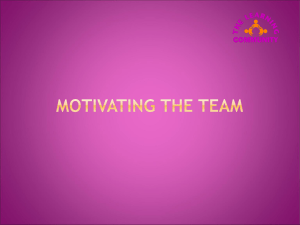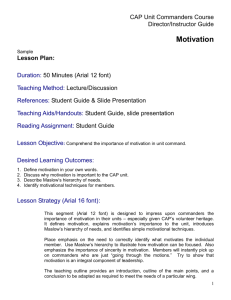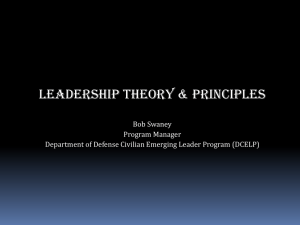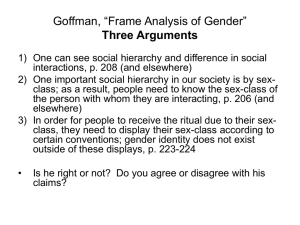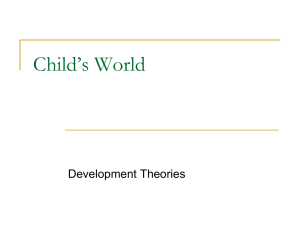Pies - NPTC Moodle
advertisement
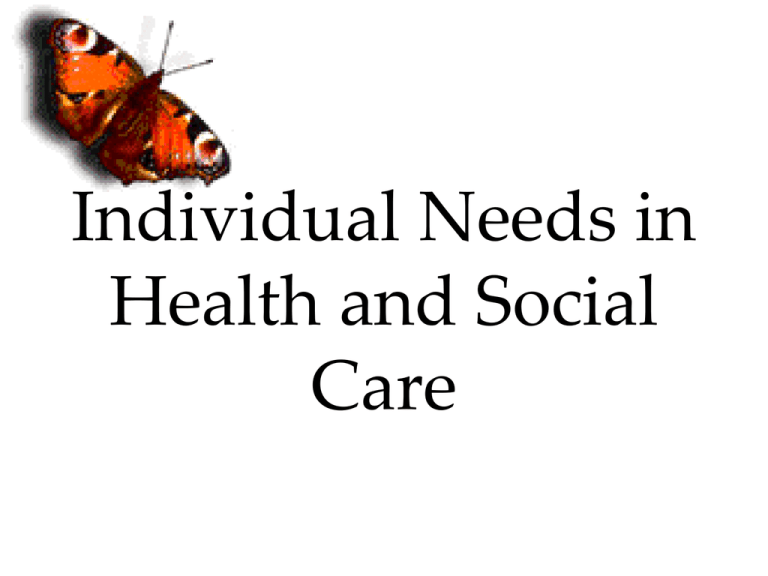
Individual Needs in Health and Social Care Desert Island Survival • During a Caribbean ferry cruise your ship hit a storm and went down. You have been shipwrecked on a desert island with only a few other remaining passengers. The island is at least 1000 miles from the closest known civilisation, and no-one knows where you are… • You manage to save a few things from the ship before it goes down but you must choose quickly. • You can pick the 5 most important items from the following list, and you must explain why you have chosen each item… Needs versus Wants What items did you identify you would need for your survival??? This Unit You will learn about people’s everyday needs You will learn about health and well being You will learn about how we have different needs at different points in our lives Maslow’s Hierachy of needs Fill in the hierarchy on your sheet Activity: Maslow’s Hierarchy 1. Look at Maslow’s Hierarchy. Are all your basic needs being met? Are your safety and security needs being meet? Write down or * where you feel you come at the moment. Level 1 is the bottom, level 5 is the top Activity: Maslow’s Hierarchy 2. Write down all the different things that affect how you feel about yourself. On a scale of 1 – 5, 1= Feel bad about yourself – 5= Feeling very good. How does this compare to the number on the pyramid?? Activity: Maslow’s Hierarchy 3.Write down 3 things that you could do to move up a level. 4. Why do you think Maslow though self actualisation was the most important level of all. Failure to meet needs How would you feel if you were homeless? How would you feel if you felt unsafe at night? Your self esteem will be affected and you might have low self- esteem… Key Word • Self- Esteem- How highly we think about ourselves Health and Wellbeing • The World Health Organisation (Who) defines “Health and wellbeing” as a state of complete physical, mental and social well-being and not merely the absence of disease or infirmity” Health and Well being Physical Mental Balance these aspects of life and you have good health Social PIESS Physical Needs We all share certain needs….. Things that affect Physical Needs Intellectual Needs • Mental activity • Motivated and interested • We continue to learn throughout life Intellectual Needs How do you get your intellectual needs met? How does a baby get their intellectual needs met? Intellectual Needs Genie Genie was isolated from human company until she was 13. – What effects did this have on her intellectual development? Activity: Stimulate your brain 1. Write a list of all the things that you could do to stimulate your brain. Compare your list with a partner’s and add any you didn’t think of. Pick one you would like to try. What is stopping you have a go? Emotional Needs • These needs are met when we experience things that make us feel happy • You need to be able to recognise and deal with different emotions throughout your live Emotional Needs • How you see yourself and how other’s see you is called your self concept • Affection, good relationships, love and respect can all affect your self concept Social Needs • These are aspects of our life which enable us to develop and enjoy good relationships and friendships Social Needs • These include mixing with others • Having access to leisure facilities and activities • Family, friends and part of a community • Bullying can stop social needs being met Spiritual Needs • This is different things to different people • It might include religion or personal beliefs • They are unique • Hope, quest for meaning, inner peace Complete the handout • Fill in the blanks and look at the case study Holistic Definition of Health • This means looking at all the PIESS • All needs should be met for good health Holistic- Looking at all the different needs of the client Understanding check 1. List all the physical needs that you have met today 2. Why are friends important (refer to PIESS) 3. Explain spiritual needs in your own words: Where do you think these belong in Maslow’s hierarchy of needs? Life Stages You will learn how needs change over 5 life stages Infants (0 – 3 years) Children (4 -10 years) Adolescents (11- 18 years) Adulthood (19- 65 years) Later Adulthood (65+ years) Infancy 0- 3 years • To be fed • To have everything done for them • Lots of sleep • To form attachments • To have secure routines • To have toys and books- fine and gross motor skills Children (4 -10 years) • Learning to be more independent so that they can develop independence in all areas of PIES • Further developing their motor skills Adolescents (11- 18 years) • Puberty creates hormone changes • This can be stressful • Friendship needs are important as you form more intimate relationships • Adolescents need to a sense of belonging • Eat well to keep up with changes in the body • Work skills need to develop Adulthood (19- 65 years) • Acceptance and more settled • Slower to acquire new knowledge • Major life decisions come into play • Women go through menopause • Adulthood is the longest stage, therefore HSC workers will encounter a lot of different needs in this stage Later Adulthood (65+ years) • More needs such as access to convenient health and leisure facilities and practical help with mobility • Retire from work P1 Choose 3 characters/ people • They must be from different life stages • Describe the life stage they are at • Identify their PIES needs and how they are being met • You need to refer to Maslow’s hierarchy of needs Recap
